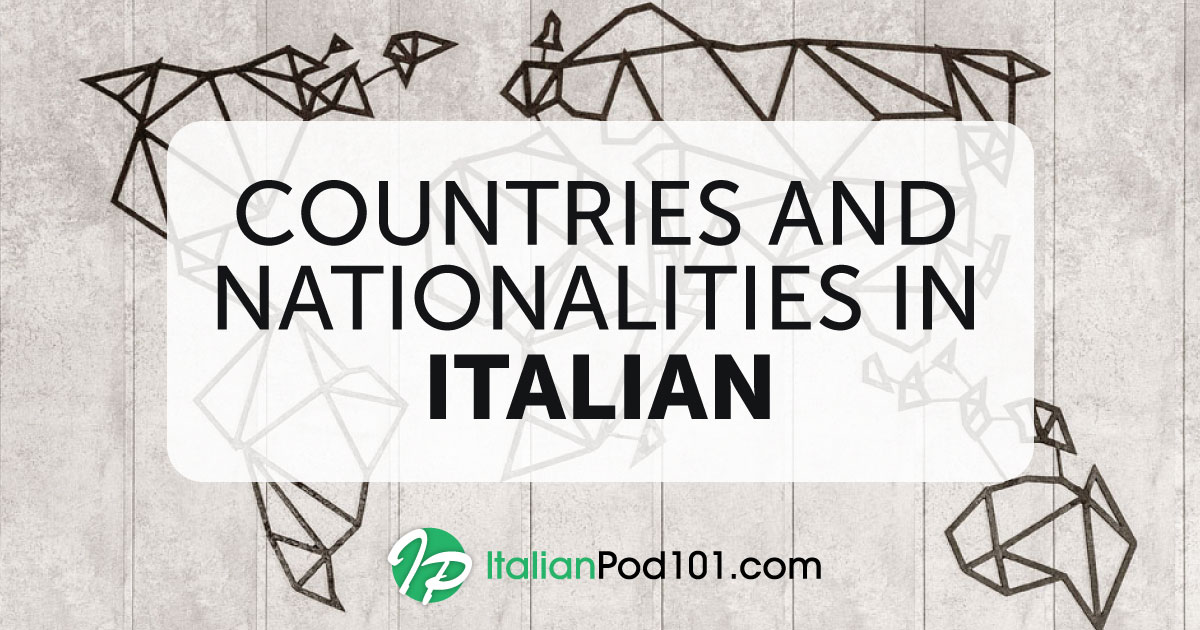
Now is the time to step up in your Italian studies. As you get ready to surpass the beginner level, you’ll need to practice using more tenses (past, future, conditional) and memorize several ready-to-use intermediate Italian phrases. To help you level up with confidence, we have prepared a list of the 50+ most common (and useful) intermediate Italian phrases for a variety of contexts. This guide will bring to your disposal all the must-know phrases for telling stories about the recent past, asking for advice, recommending a restaurant to someone, and more.
If you ever want to go deeper with your learning or have any questions, take a look at all the available Italian lessons, free resources, and interactive material on ItalianPod101.com!
 Table of Contents
Table of Contents
- Talking About Past Events
- Making and Changing Plans
- Explaining and Listing Reasons
- Making Recommendations and Complaints
- Reaction Phrases for Everyday Conversations
- Etiquette Phrases for Social and Business Settings
- Conclusion
1. Talking About Past Events
So, you have already mastered simple sentences in the present. You can introduce yourself, describe yourself, ask for simple things, and give simple instructions.
It’s time now to venture into more complex sentence structures, such as those for talking about stories or memorable experiences from the past. It could be talking about a recent night out or giving information about your family or your childhood. And if you want to learn even more conversational phrases, here you go!
When you talk about the past in Italian, you cannot avoid needing to decide between passato prossimo and imperfetto. If you need a little help with this, make sure you check out this lesson to see a good example and explanation of their use.
Ready? Here are some intermediate Italian phrases for discussing the past.

Che bella serata! (“What a nice night!”)
| È stata una bella serata! |
| It was a beautiful evening! |
| Another way of saying the same thing: Che bella serata! (“What a beautiful evening!”) |
| Ci siamo divertiti moltissimo ieri sera. |
| We had a lot of fun last night. |
| Ho iniziato a lavorare nel 2017. |
| I started working in 2017. |
| Sono stato a Roma 3 anni fa. |
| I was in Rome three years ago. |
| Da piccolo/a avevo tanti amici. |
| As a child, I had many friends. |
| Literally: “As little, I had many friends.” You find the same construction with da ragazzo/a (“as a young boy/young girl”) and da giovane (“as a young man/woman”). |
| Mia nonna era pugliese. |
| My grandmother was from Puglia. |
| L’anno scorso sono stata in vacanza al mare. |
| Last year, I went on vacation at the beach. |
| Siamo stati sposati per 7 anni. |
| We’ve been married for seven years. |
2. Making and Changing Plans
Making and changing plans in the immediate future is something that you’ll often need to do when interacting with friends and colleagues, organizing an event or meeting, or putting together a fun party.
Are things getting complicated? Don’t worry. Just learn these simple intermediate Italian phrases, and they’ll help get you out of any trouble. Notice that even though we’re talking about the immediate future, in Italian, we don’t always need to use the future tense. Using the present tense with the appropriate temporal adverb is usually enough to convey that we’re talking about the future.

Posso portare qualche amico? (“Can I bring a few friends?”)
| Sei pronta per uscire? |
| Are you ready to go out? |
| Sei disponibile per una riunione domani? |
| Are you available for a meeting tomorrow? |
| Ne parliamo dopo. |
| Let’s talk about it later. |
| Notice the use of ne, meaning “of it” or “about it.” |
| Possiamo rinviare l’appuntamento alla settimana prossima? |
| Can we postpone the appointment until next week? |
| Posso portare qualche amico? |
| Can I bring some friends? |
| Notice that the indefinite adjective qualche, even though it means “some,” is always followed by a noun in the singular. |
| Facciamo una videochiamata per entrare nei dettagli. |
| Let’s have a video call to get into the details. |
3. Explaining and Listing Reasons
Sometimes, you’ll find yourself in situations where you will have to explain what happened or give reasons for your actions. Once you reach an intermediate level of proficiency in Italian, it’s important that you’re able to do this with relative ease. But don’t worry about it! We’re here to help you with some ready-to-use intermediate Italian phrases for giving reasons and explanations.
If you need more intermediate Italian vocabulary, check out our free dictionary on ItalianPod101.com, where you can search for specific words and listen to their perfect pronunciation!

Sei di nuovo in ritardo! (“You’re late again!”)
| Sono in ritardo perché non ho sentito la sveglia. |
| I’m late because I didn’t hear the alarm. |
| Questo è il motivo per cui non mi piace. |
| This is why I don’t like it. |
| Literally: “This is the reason for which I don’t like it.” Note that cui is the relative pronoun (just like che – “that”) that we use together with prepositions such as di, a, da, in, con, su, per, tra, fra (“of, to, from, on, in, with, for, by, among”). |
| Ti do tre buone ragioni per non uscire stasera: primo, sta piovendo tantissimo; secondo, ho preparato una buonissima lasagna; infine… non ne ho voglia! |
| I’ll give you three good reasons not to go out tonight: First, it’s raining a lot; then, I prepared a very good lasagna; finally…I don’t feel like it! |
| Piove troppo, quindi resto a casa. |
| It’s raining too much, so I’m staying at home. |
| Devi assolutamente venire alla mia festa, altrimenti mi arrabbio! |
| You absolutely must come to my party; otherwise, I will get mad! |
| Visto che non hai capito, te lo spiego di nuovo. |
| Since you didn’t understand, I’ll explain it again. |
4. Making Recommendations and Complaints
How do we know if something is good or not so good? We usually rely on friends’ recommendations or, now that we’re in the era of social media, opinions and comments left by users on internet platforms.
So, let’s get ready to give five stars or to voice our complaints!
- ➜ And, if you’re lucky enough to go to an Italian restaurant, check out our free restaurant vocabulary list.

Posso reclamare col cuoco? (“Can I complain to the chef?”)
| È un piatto fantastico. Dovresti provarlo. |
| It’s a wonderful dish. You should try it. |
| Te lo consiglio vivamente. |
| I strongly recommend it. |
| È il miglior ristorante della città. |
| It’s the best restaurant in town. |
| È la miglior pizza di Napoli. |
| It’s Napoli’s best pizza. |
| È un hotel bello ed economico. Sicuramente ci tornerò. |
| It’s a nice and cheap hotel. I’ll definitely go back. |
| Il servizio in quel locale non è un granchè. |
| The service in that place is not that great. |
| Mi sono lamentato con il servizio clienti. |
| I complained to the customer service. |
5. Reaction Phrases for Everyday Conversations
In any conversation, it’s important to have the right reaction to what we’re being told. This helps us better empathize with the other party, and it makes them feel that we care or that we’re impressed.
As a beginner, you might often find yourself struggling to find the appropriate words. And that’s okay. But once you reach an intermediate level, you’ll want to be able to say the right thing at the right time. In fact, learning natural reaction phrases is one of the best ways to improve your Italian at this stage!
Here are some sample conversations to help with that. And don’t forget that body language and intonation also play important roles in establishing empathy in a conversation. Especially in Italy!
A: È stata una bella serata! (“It was a beautiful evening!”)
B: È vero! Anch’io mi sono divertito/a! (“True! I had fun too.”)
A: Ci siamo divertiti moltissimo ieri sera! (“We had a lot of fun last night!”)
B: Davvero moltissimo! (“Really a lot!”)
A: Ho iniziato a lavorare nel 2017. (“I started working in 2017.”)
B: Complimenti! E dove lavoravi? (“Congratulations! And where were you working?”)
A: Sono stato a Roma tre anni fa. (“I was in Rome three years ago.”)
B: Fantastico! Anche a me piacerebbe visitare l’Italia. (“Fantastic! I would also like to visit Italy.”)
A: Da piccolo avevo tanti amici. (“As a child, I had many friends.”)
B: Che bello! Eri un bambino felice? (“How nice! Were you a happy kid?”)
A: Mia nonna era pugliese. (“My grandmother was from Puglia.”)
B: Come si chiamava tua nonna? (“What was your grandma’s name?”)
- ➜ Notice how nonna/o translates both as “grandmother”/“grandfather” and as “grandma”/“grandpa.”
A: L’anno scorso sono stata in vacanza al mare. (“Last year, I went on vacation at the beach.”)
B: Io invece sono stato in montagna. (“On the other hand, I went to the mountains.”)
A: Siamo stati sposati per 7 anni. (“We had been married for seven years.”)
B: Avete divorziato? Mi dispiace. (“Did you get divorced? Sorry to hear that.”)
A: Vorremmo adottare un cane. (“We would like to adopt a dog.”)
B: Buona idea! (“Good idea!”)

Che bello! Ho adottato un cane… (“How wonderful! I adopted a dog…”)
6. Etiquette Phrases for Social and Business Settings
And last but not least, here are some intermediate-level Italian phrases for being polite in a variety of social and business contexts. Learning them will give you a leg up in your personal and professional life while in Italy, because good etiquette is always appreciated.
Do you want to know more? Check out our article on everything you should know about Italian etiquette.
| Buon appetito. |
| Bon appetit. |
| To this, you can reply: Grazie, e altrettanto! (“Thanks, and to you too!”) |
| Buongiorno, (come) posso aiutarla? |
| Hello, (how) can I help you? |
| Benvenuto/a nel nostro negozio. |
| Welcome to our store. |
| Accomodati. [Informal] |
| Please, come in. |
| Literally: Get comfortable. Notice how it changes when we use the formal: Si accomodi. |
| Fa’ come se fossi a casa tua. |
| Make yourself at home. |
| Literally: Do as if you were at your house. |
| Fammi sapere se hai domande. |
| Let me know if you have questions. |
Some variants include:
|
| Mi fai sapere cosa ne pensi? |
| Will you let me know your thoughts? |
| Literally: Will you make me know what you think about it? |
| Resto in attesa di una tua risposta. |
| I look forward to your response. |
| Literally: I remain waiting for an answer of yours. |
| Buon lavoro! |
| Have a good workday! |
| Literally: Have a good work. This phrase shouldn’t be confused with Bel lavoro! (“Good job!”) |
| Buon viaggio! |
| Have a nice trip! |
| Buone vacanze! |
| Have a nice vacation! |

Buone vacanze! (“Have a nice vacation!”)
7. Conclusion
I hope you liked this guide and that you found it useful for increasing your arsenal of intermediate Italian phrases. Do you know what else you might find useful and interesting? All the incredible learning tools you’ll find on ItalianPod101.com, such as the vocabulary lists and other free resources.
Have fun learning Italian with our podcasts, videos, and YouTube channel. And if you upgrade to Premium PLUS, you can check out MyTeacher to get personal 1-on-1 coaching with your own private teacher. They can help you practice the intermediate phrases from this list and aid you in creating your own. In addition to providing you with personalized assignments and exercises, your teacher can record audio samples just for you and review all your work.
Keep having fun with ItalianPod101!










